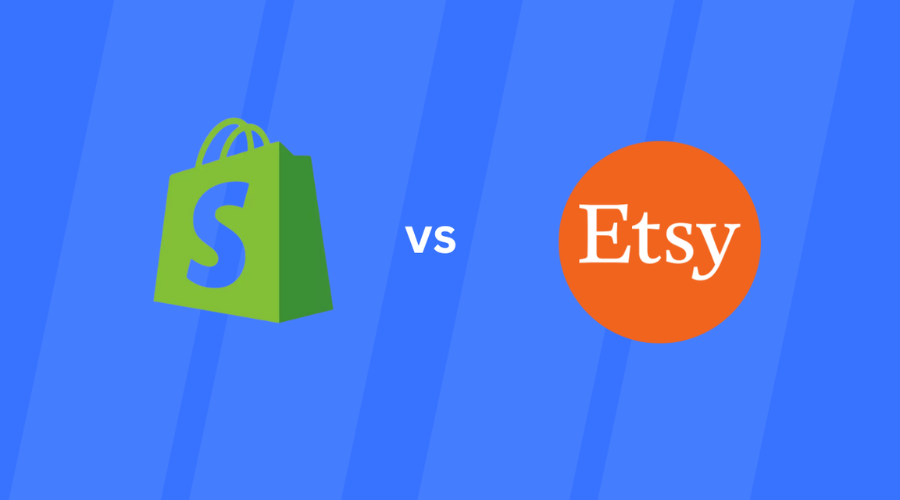Shopify vs Etsy are two of the maximum popular systems available, each of them with its personal specific capabilities and blessings. While Etsy is understood for its recognition of handmade and vintage gadgets, Shopify gives a complete, customisable solution for all forms of e-trade groups. This weblog will examine the 2 systems, highlighting the advantages of Shopify and why it might be the higher preference in your online store.
What are the Key Features: Shopify vs Etsy
1. Customisation and Design
Shopify
- Themes and Templates: Shopify offers an extensive range of professionally designed issues that can be customised to healthy your emblem’s identity. These subject matters are mobile-responsive and user-pleasant, making sure a seamless shopping revel in for your customers.
- Customisation Options: Between Shopify vs Etsy considering customisation options is important for all sorts of reasons. And that’s why Shopify offers effortlessly customisation options to design your online store. You can use custom codes like HTML or CSS and get help with third-party apps to ease your customisation.
- Branding: When it comes to branding as well it pays keen attention to making your brand recognised, this is with the help of supplying unique domain names when designing your web store online.
Etsy
- Limit in Customisation: Etsy offers fewer customisation options in comparison to Shopify. While you can customise your save’s look to some extent, the overall layout remains constant with Etsy’s market layout.
- Marketplace Identity: On Etsy, your keep is part of a larger market, which may make it tough to establish a wonderful logo identity.
2. Sales Channels and Integration
Shopify
- Multi-Channel Selling: Shopify enables you to sell through different e-commerce platforms, consisting of your online store, social media, marketplaces like Amazon and eBay, and even in-character through Shopify POS. This flexibility facilitates you to reach a broader audience and boost income. That is why between Shopify vs Etsy, in marketing Shopify stands out.
- Third-Party Integrations: Shopify’s App Store offers hundreds of integrations with tools for marketing, stock management, customer support, and more, permitting you to streamline your enterprise operations.
Etsy
- Marketplace Exclusivity: Etsy typically focuses on its very own marketplace, proscribing your capability to sell through other channels. While Etsy does offer a few integration alternatives, they’re now not as huge as Shopify’s. For extensive marketing between Shopify vs Etsy, retailers should check out Shopify’s marketing tools.
- Built-In Audience: One benefit of selling on Etsy is its set-up purchaser base, which can assist in driving traffic to your listings.
3. Marketing and Search Engine Optimisation
Shopify
- Marketing Tools: Shopify offers a collection of advertising tools, such as email advertising, social media integration, cut price codes, and deserted cart restoration. These capabilities help you entice and hold customers.
- Search engine marketing Capabilities: Shopify is built with SEO excellent practices in mind, imparting customisable name tags, meta descriptions, and URL structures to enhance your save’s visibility on engines like Google.
- Blogging Platform: Shopify includes running a blog characteristic that allows you to create content to interact with your customers and enhance your SEO rankings.
Etsy
- Limited Marketing Tools: Etsy’s advertising equipment is more constrained as compared to Shopify. While Etsy offers a few promotional options, together with income and coupons, the platform lacks a comprehensive advertising function.
- Etsy Ads: Etsy does offer marketing options inside its market, but those commercials compete with different sellers and may not offer the same degree of management and focus as Shopify’s marketing tools.
4. Pricing and Fees
Shopify
- Subscription Plans: Between Shopify vs Etsy the monthly subscription plans differ largely and when it comes to affordability they offer better yearly and monthly plans. Each plan that you choose offers extensive features to allow you to pick the one that best fits your investments.
- Transaction Charges: Shopify costs a transaction rate if you use a payment gateway apart from Shopify Payments. These costs vary from 2% to ).5%, depending on your subscription plan.
- Additional Costs: While Shopify’s subscription prices might be better, the platform’s huge functions and scalability often justify the funding.
Etsy
- Listing Fees: Etsy charges a $0.20 price according to the object indexed, which could upload up if you have a large stock.
- Transaction Fees: Etsy prices a 6.5% transaction charge on the sale charge, along with transport.
- Payment Processing Fees: Etsy additionally charges fee processing prices, which vary throughout the United States of America but are usually around 3% plus $0.25.
5. Scalability and Growth
Shopify
- Scalability: Shopify is designed to develop along with your business. Whether you’re starting with a small shop or increasing to a large business enterprise, Shopify’s infrastructure can manage increased visitors, sales, and product listings without compromising overall performance.
- Advanced Features: As your business grows, you can access superior capabilities like Shopify Plus, which offers business enterprise-degree answers, committed aid, and more suitable customization alternatives.
Etsy
- Limited Scalability: Etsy’s market version may also restrict your capability to scale in comparison to Shopify. While Etsy is outstanding for small businesses and personal sellers, it is able to not provide the important equipment and flexibility for massive growth.
Shopify vs Etsy: Why people prefer Shopify over Etsy

While each Shopify and Etsy offer particular advantages, Shopify may be the greater versatile and scalable platform for e-trade groups. Here are a few key motives why Shopify might be the better desire in your online shop.
- Customisation and Branding: It allows users to access a large extension of customisation features, which helps you to create your own branding and an online store.
- Multi-Channel Selling: With Shopify the best part of doing online selling is that you can sell goods on different e-commerce platforms. This allows you to reach a wide range of customers.
- Marketing Tools and Features: You can get access to marketing features like SEO tools to promote your brand and goods. This allows you to stay ahead of marketing strategies.
- Scalability: Irrespective of what number of sales you do it allows you to scale your investments. You can make bigger sales of goods in the future.
- Control and Flexibility: Owing a branding online store means that you can control and monitor on your own.
Shopify vs Etsy: an Overview
| Features | Shopify | Etsy |
| Listing Fees | 3-6.5% | Yes |
| Transaction fees | Yes | Yes |
| Unlimited Products | X | Yes |
| HTML and CSS Tool | X | Yes |
| 24/7 Support | Yes | 24/in English |
| Sellers apps | X | Yes |
| Customization | X | Yes |
| First-Party POS System | X | Yes |
| Domain Name | X | Yes |
| Dropshipping | X | Yes |
| Own Customer List | X | Yes |
| Enterprise Plan | X | Yes |
| Detailed Reporting | X | Yes |
| App Store | X | Yes |
| Mobile App for retailers | Yes | Yes |
| Built-in Blog CMS | X | Yes |
| Scalable for merchants | X | Yes |
Conclusion
While Etsy is a remarkable platform for niche markets and individual retailers, Shopify’s robust features, scalability, and customisation alternatives make it the superior desire for business owners and website owners seeking to set up a strong online presence and reap a long-term boom. Between Shopify vs Etsy, the possibility of getting your online presence and expanding your marketing income with Shopify is higher. Especially if you are looking for a dropshipping journey.
For more information visit Thesinstyle.












